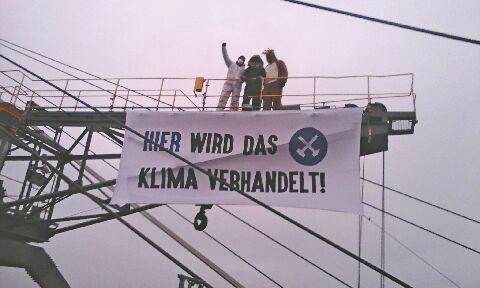
'Protest party without German participation' was the title of a recent article in the German daily newspaper taz on the admittedly striking absence of the increasingly strong and dissenting German anti-coal movement in the protests and activist spaces in Paris. A feeling of reproach was in the air that the Germans do not really care about anything that does not happen in their country. Last summer, their 'Ende Gelände' campaign received broad support from non-German activists, in particular from France, and the feeling was that they should repay that commitment now. In Germany, they make their own schedules and do not care about anything else.
The last couple of days, however, have shown that we need to correct that impression. Indeed, the experiences during the 2009 climate summit in Copenhagen probably affected German activists more than others. Nearly 1,000 people were arrested pre-emptively and the massive mobilisation efforts of German climate activists led to nothing. Moreover, German climate activists also enjoy the 'luxury' of not having to wait for a COP to do something about the climate. With the struggle against lignite mining and for a democratic, decentralised energy transition they are in the midst of a struggle they could actually win.
However, this does not mean that the German climate and anti-coal movement pays no heed to the international context. The current wave of direct action in Germany against coal and for climate justice - timed precisely to coincide with and closely related to the Paris summit - is evidence of this.
Action 1: On Saturday, around 20 climate activists blocked the access road to RWE's Niederaussem power station. This power station emits around 30 million tons of CO2 per year, making it the third most emissions-intensive power station in Europe. In their press statement, the activists explicitly referred to the summit in Paris. They emphasised the analysis broadly shared by activists that climate protection will not be decided at the negotiating table in Paris but rather in the global CO2 hotspots. They embedded their action in the context of the 'Climate Games', a decentralised set of direct actions during the two weeks of the summit.
Action 2: Also on Saturday, ten activists forced their way into the 'Vereinigtes Schleenhain' opencast mine in the central German lignite mining region south of Leipzig. They blocked a huge bucket-wheel excavator and managed to stop it working for several hours. Under the logo of the 'Ende Gelände' campaign they printed the slogan 'System Change, not Climate Change', which has been the rallying call for the climate justice-oriented wing of the climate movement since Copenhagen.
Action 3: On Friday, several climate activists had already unravelled a huge banner on Berlin's iconic Victory Column. Their simple but effective slogan 'Climate Justice Now!' was on display for several hours. Their slogan, and this is no coincidence, bore the name and central demand of one of the two large international networks of climate activists.
Action 4,5,6... Today, activists have again disrupted production in German lignite mines in the Jänschwalde and Welzow Süd opencast mines in the Lusatia lignite mining region. Their slogan: 'This is where the climate is being negotiated'.
It is therefore simply not true that German activists are absent from the protests against the Paris climate summit. They have simply chosen other places for their actions. No matter whether in Paris or CO2 hotspots, activists are convinced that the COP cannot protect the climate; climate protection is something that has to be struggled for at the local level. It is here that they believe it will be decided whether we can prevent catastrophic climate change.